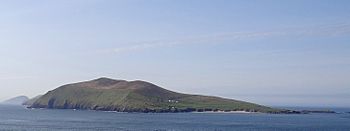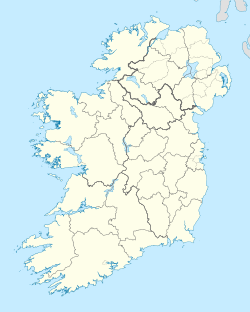Great Blasket Island facts for kids
|
Native name:
An Blascaod Mór
|
|
|---|---|

Great Blasket from Dunmore Head
|
|
| Geography | |
| Location | Atlantic Ocean |
| Coordinates | 52°05′33″N 10°32′33″W / 52.09250°N 10.54250°W |
| Archipelago | Blasket Islands |
| Major islands | Great Blasket Island, Beginish, Inishnabro, Inishvickillane, Inishtooskert, Tearaght Island |
| Area | 4.29 km2 (1.66 sq mi) |
| Highest elevation | 292 m (958 ft) |
| Highest point | An Cró Mór |
| Administration | |
| Province | Munster |
| County | Kerry |
| Demographics | |
| Population | 0 (2011) |
| Pop. density | 0 /km2 (0 /sq mi) |
| Additional information | |
| inhabited until 1953 | |
Great Blasket (Irish: An Blascaod Mór) is the main island of the Blasket Islands group. It is located off the coast of County Kerry, Ireland.
Contents
Exploring Great Blasket Island
Great Blasket Island is about two kilometers from the mainland, near Dunmore Head. It stretches for six kilometers to the southwest. The highest point on the island is An Cró Mór, which is 292 meters tall.
The closest town on the mainland is Dunquin. During the summer, you can take a ferry from a nearby pier to visit the island.
The very eastern tip of the island, Garraun Point, is sometimes mistakenly called the most western point of mainland Ireland. However, Tearaght Island, another island in the Blasket group, is actually the most western point of the Republic of Ireland.
A Look at History
A long time ago, there was a castle belonging to the Ferriter family at a place called Rinn an Chaisleáin.
The island was home to people until 1953. The Irish government decided it was too difficult to keep the remaining people safe there. The islanders themselves had asked to be moved since 1947. A sad event helped speed up this decision: a man named Seánín Ó Cearnaigh became very ill. Bad weather meant no doctor or priest could reach the island to help him. The weather was so bad that his body could not even be taken to the graveyard on the mainland for several days. This sad event led the islanders to ask the government to help them move.
Great Blasket Island was the home of three famous Irish writers: Tomás Ó Criomhthain, Peig Sayers, and Muiris Ó Súilleabháin. They all wrote their books in the Irish language. Their stories have been translated into English and many other languages. Muiris Ó Súilleabháin's home is now in ruins. However, Peig Sayers' second home on the island has been fixed up. Tomás Ó Criomhthain's home was also restored in 2018 and is open for visitors.
Until 1953, the people living on Great Blasket Island were the most western community in Ireland. This small fishing village had about 160 people at its busiest time. They lived in simple cottages on the sheltered northeast side of the island. In April 1947, after being cut off from the mainland for weeks by bad weather, the islanders sent a telegram to the Taoiseach (Ireland's Prime Minister), Éamon de Valera. They urgently asked for supplies, which arrived by boat two days later.
In 2014, Billy O'Connor started fixing up some old buildings on the island. Now, these restored cottages can be rented during the summer. His company hires two caretakers each year to look after the cottages and a small café. These caretakers live on the island without electricity or hot water.
In 2019, Lesley Kehoe and Gordon Bond shared their experience of living and working on the island for six months on social media. This attracted attention from all over the world! The next year, thousands of people applied for the caretaker job. Eoin Boyle and Annie Birney, a couple from Dublin, were chosen.
Island Population Over Time
The table below shows how the number of people living on Great Blasket Island changed over the years.
| Historical population | |||||||||||||||||||||||||||||||||||||||||||||||||||||||||||||||||||||||||||||||||||
|---|---|---|---|---|---|---|---|---|---|---|---|---|---|---|---|---|---|---|---|---|---|---|---|---|---|---|---|---|---|---|---|---|---|---|---|---|---|---|---|---|---|---|---|---|---|---|---|---|---|---|---|---|---|---|---|---|---|---|---|---|---|---|---|---|---|---|---|---|---|---|---|---|---|---|---|---|---|---|---|---|---|---|---|
|
|
|
|||||||||||||||||||||||||||||||||||||||||||||||||||||||||||||||||||||||||||||||||
| Source: | |||||||||||||||||||||||||||||||||||||||||||||||||||||||||||||||||||||||||||||||||||
Island Stories and Books
Even though the island had a very small population, it produced many talented writers. They wrote vivid stories about their difficult lives and kept old Irish folk tales alive. Some of their most famous books include Machnamh Seanamhná (An Old Woman's Reflections, by Peig Sayers, 1939), Fiche Bliain Ag Fás (Twenty Years A-Growing, by Muiris Ó Súilleabháin, 1933), and An tOileánach (The Islandman, by Tomás Ó Criomhthain, 1929).
Who Owns the Island?
There was once a disagreement about who owned parts of the island. The Irish State wanted to make the island a national park. However, one person claimed to own most of the island. This disagreement was settled in 2007. An agreement was made for more than 95% of the island, including the old village, to be sold to the State. This meant it would become a national park. In 2009, the Office of Public Works bought most of the land. Now, the Irish State owns the majority of the island. Guided tours of the island started in 2010. There are also plans to protect and preserve the old village.
Images for kids
-
Grey seal colony on Great Blasket
 | George Robert Carruthers |
 | Patricia Bath |
 | Jan Ernst Matzeliger |
 | Alexander Miles |






